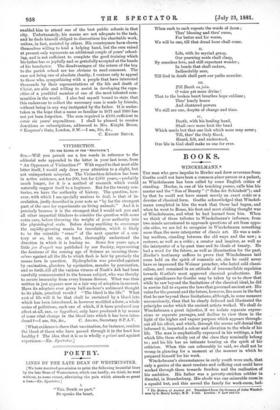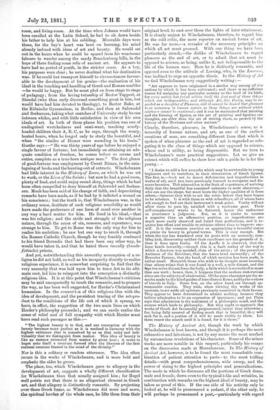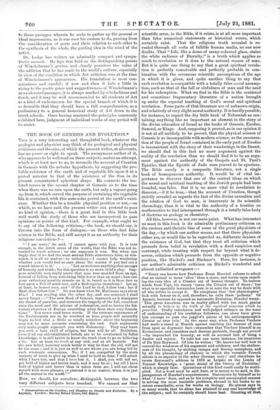BOOKS.
WINCKELMANN.*
THE man who gave impulse to Herder and drew reverence from Goethe could not have been a common-place person or a pedant, as Winckelmann has been called by some English critics of standing. Herder, in one of his touching poems, calls him his master and the " Son of Beauty" (" Sohn der Schonheit"); and by that he could not have meant merely an exact critic or a devotee of classical form. Goethe acknowledged that Winckel- mann completed in him the work that Oeser had begun, and when he went to Rome, his first and most abiding thought was of Winckelmann, and what he had learned from him. When we think of these tributes to Winckelmann's influence, from two minds accustomed to approach questions of art from oppo- site sides, we are led to recognise in Winckelmann something more than the mere interpreter of classic art. He was a unit- ing medium, standing between the old ways and the new; a restorer, as well as a critic ; a creator and inspirer, as well as the interpreter of a by-past time and its ideals of beauty. Her had a word for the future, as well as illumination for the past. Herder's testimony suffices to prove that Winekelmaun laid some hold on the spirit of romantic art, else he could never have so impressed the Weimar preacher, who hated cold classi- calism, and remained in an attitude of irreconcilable repulsion towards Goethe's most approved classical productions. His great significance for Goethe may be taken by us to show that while he saw beyond the limitations of the classical ideal, he did in nowise fail to express the laws that governed ancient art. His value for the present and the future, however, lies more in the fact that he saw beyond these limitations, although, in some measure unconsciously, than that he clearly deduced and illustrated the principles under which the ancient artists worked. We shall do Winckelmann a great injustice, if we isolate separate expres- sions or separate passages, and decline to view them in the light of the higher and vaguer purpose which appears through- out all his effort, and which, through the serene self-denial that informed it, imparted a colour and elevation to the whole of his life. The man is emphatically expressed in his writings, a fact which lifts them wholly out of the class they nominally belong to ; and his life has an intimate bearing on the spirit of his criticism. When this can colourably be said, we shall not be wrong in glancing for a moment at the manner in which he prepared himself for his work.
Winckelmann's circumstances in early youth were such, that only a genius of the most resolute and sufficing cast could have worked through them towards freedom and the realisation of his ambition. His father was a poverty-stricken cobbler in Stendal, in Brandenburg. His abode was one miserable room in a squalid hut, and this served the family for work-room, bed-
• The History of Ancient Art. Translated from the German of John Winckel- man by G. Henry Lodge, M.D. 2 vols. London; S. Low and Co.
room, and living-room. At the time when Johann would have been enrolled at the Latin School, he had to sit down beside his father to help him at his cobbling. Miserable days were these, for the boy's heart was bent on learning, his mind already imbued with ideas of art and beauty. He would set out in the hours when he could be spared from his wearisome labours to wander among the sandy Brandenburg hills, in the hope of there finding some relic of ancient art. He appears to have had no period of youth, in the stricter sense. As a boy, his purposes were clear ; he never doubted what his destination vas. If he could but transport himself to circumstances favour- able to the development of his genius—the realisation of his ideal in the touching and handling of Greek and Roman marbles —he would be happy. But he must plod on from stage to stage of pedagogy ; from the loving tutorship of Rector Tappert, at Stendal (who thus early discerned something great in him, but would have had him devoted to theology), to Rector Bake, at the Igdnische Gymnasium, in Berlin ; and then at Salzwedel and Seehausen, taking what snatches of University study he can between whiles, and with little satisfaction in view of his own ideals of art. In both of these places his position was one of undisguised wretchedness and semi-want, teaching scurfy- headed children their A, B, C, as he says, through the weary, heated hours, when he longed only to study the beautiful, and when "the similes of Homer were sounding in his brain."
Goethe says :—" He was thirty years of age before he enjoyed a single favour of fortune ; but immediately on attaining an ade- quate condition of freedom, he comes before us serene and entire, complete as a true-born antique man." The first gleam of good-fortune was employment by Count Milan, in the cata- loguing of books and the hunting-out of extracts. Winckelmann had little interest in the History of Laws, on which he was set to work, or the Lives of the Saints ; but now he had a good room, plenty of food, and could enjoy sound sleep, things which he had been often compelled to deny himself at Salzwedel and Seehau- sen. Much has been said of his change of faith, and depreciating remarks have been made, as if he had by it inflicted a wound on his conscience ; but the truth is, that Winckelmaun was, in the ordinary sense, destitute of such religious sensibility as would have made the preference of one form of creed over another in -any way a hard matter for him. He lived in his ideal,—that vas his religion ; and the strife and struggle of the religious nature, through the sense of sin, remorse, and repentance, was strange to him. To get to Rome was the only way for him to realise his ambition ; he saw but one way to reach it, through
the Boman Catholic Church, though he very frankly confessed to his friend Berendis that had there been any other way, he 'would have taken it, and that he hated those rascally (lamas-
fatische) priests.
And yet, notwithstanding this unworthy assumption of a re- ligion he did not hold, as well as his incapacity directly to realise religious experience, it is somewhat surprising to find that the very necessity that was laid upon him to trace Art to its ulti- mate root, led him to reimport into the conception a distinetly religious idea. It is at this point that Winckelmann's criticism may be said unexpectedly to touch the romantic, and to prepare
-the way, as has been well suggested, for Herder's Christianised humanism. In the connection of this religious idea with the idea of development, and the persistent tracing of the art-pro- duct to the conditions of the life out of which it sprang, we have, in effect, the suggestion of the two main lines on which
Herder's philosophy proceeded; and we can easily realise the sense of relief and of full sympathy with which Herder must thave read such passages as this :—
"The highest beauty is in God, and our conception of human beauty becomes more perfect as it is realised in harmony with the :highest existence that is conceived by us as that unity and indi- -viduality that we distinguish from matter. This idea of beauty is like an essence extracted from matter by great heat ; it seeks to beget unto itself a creature formed after the likeness of the first rational creature framed in the mind of the divinity."
Nor is this a solitary or random utterance. The idea often recurs in the works of Winckelmann, and is more bold and
emphatic the older he grows.
The place, toe, which Winckelmann gave to allegory in the development of art, suggests a wholly different classification for Winckelmann than that usually assigned him ; for Hegel well points out that there is no allegorical element in Greek art, and that allegory is distinctively romantic. By projecting
over these Greek forms, as Winckelmann did more and more, the spiritual burden of the whole race, he lifts them from their original level, to cast over them the lights of later attainment. It is clearly unjust to Winckelmann, therefore, to regard him as the cold critic, the mere reporter on ancient forms of art. He was far more,—a revealer of the necessary principles on which all art must proceed. With one thing we bare been particularly struck,—the dislike of Winckelmann to regard pleasure as the end of art, or to admit that art must be opposed to science, as being, unlike it, not indispensable to the life of the human race. Here he is distinctly romantic, and opposed even to the attitude of Lessing, who, in the Laocoon, was inclined to urge an opposite thesis. In the History of Art we find Winckelmann very suggestively writing :— " Art appears to have originated in a similar way among all the nations by which it has been cultivated ; and there is no sufficient reason for assigning any particular country as the land of its birth, for every nation has found within itself the first seed of those things which are indispensable ; and although Art, like Poetry, may be re- garded as a daughter of Pleasure, still it cannot be denied that pleasure is as necessary to human nature as those things are without which existence cannot be continued; and it can be maintained that painting and the forming of figures or the art of painting and figuring our thoughts are older than the art of writing them, as proved by the history Of the Mexicans and other nations."
Clearly, therefore, pleasure, in Winckelmann's sense, as a necessity of human nature, and art, as one of the earliest creations of man, are something different from that which is spoken of when pleasure as the end of art is regarded as rele- gating it to the class of things which are opposed to science, whose end is utility, as being dispensable. But we turn to Winckelmann's more practical suggestions. Let us give an extract which will suffice to show how safe a guide he is for the
young : —
"I desire to add a few remarks which may be serviceable to young beginners and to travellers, in their observation of Greek figures. The first is,—Seek not to detect deficiencies and imperfections in works of art, until you have previously learned to recognise and dis- cover beauties. This admonition is the fruit of experience, of noticing daily that the beautiful has remained unknown to mdst observers,— who can see the shape, but must learn the higher qualities of it from others,—because they wish to act the critic before they have begun to be scholars. It is with them as with schoolboys, all of whom have wit enough to find out their instructor's weak point. Vanity will not allow them to pass by, satisfied with a moderate gaze. Their self-complacency wants to be flattered, hence the endeavour to pronounce a judgment. But, as it is easier to assume a negative than an affirmative position, so imperfections are much more easily observed and found than perfections, and it re- quires less effort and trouble to criticise others thau to improve one- self. It is the common practice on approaching a beautiful statue to praise its beauty in general terms. This is easy enough. But when the eye has wandered over its parts with an unsteady, ram- bling look, discovering neither their excellence nor the grounds of it, then it fixes upon faults. Of the Apollo it is observed, that the knee bends inwardly,—though this is a fault rather of the way in which a fracture was mended, than of the artist ; of the preserved Antinoas of the Belvidere, that the knees bend outwardly; of the Hercules Farnese, that the head, of which mention has been made, is rather small. Herewith those who wish to be thought more knowing than others relate that it was found in a well, a mile distant, and the legs tea miles distant from the body, a fable which is accredited in more than one work ; hence then, it happens that the modern restorations alone are the subjects of observation. Of the same character are the re- marks made by the blind guides of travellers at Rome, and by the writers of travels in Italy. Some few, on the other hand, err through un- reasonable caution. They wish, when viewing the works of the ancients, to set aside all opinions previously conceived in their favour. They appear to have determined to admire nothing, because they believe admiration to be an expression of ignorance ; and yet Plato says that admiration is the sentiment of a philosophic mind, and the avenue which leads to philosophy. But they ought to approach the works of Greek Art favourably prepossessed, rather than otherwise ; for, being fully assured of finding much that is beautiful, they will seek for it, and a portion of it will be made visible to them. Let them renew the search until it is found, for it is there."
The History of Ancient Art, though the work by which Winckelmann is best known, and though it is perhaps the most exhaustive and laborious, is not by any means the most marked by unconscious revelations of his character. Some of the minor works are more notable in this respect, particularly his essays on the discoveries made at Herculaneum. In The History of Ancient Art, however, is to be found the most remarkable com- bination of patient attention to parts—to the most trifling details—with great comprehensiveness, wide sweep, and the power of rising to the highest principles and generalisations. The mode in which he discusses all the portions of Greek dress, male and female, down even to the typical folds and wrinkles, in combination with remarks on the highest ideal of beauty, may be taken as proof of this. If the one side of his activity only be looked at, he will be pronounced a pedant, if the other only, he
will perhaps be pronounced a poet,—particularly with regard te.those passages wherein he seeks to gather up the general or ideal impressions, as it was ever his custom to do, passing from the consideration of parts and their relation to each other to the synthesis of the whole, the guiding idea in the mind of the artist.
Dr. Lodge has written an admirably compact and sympa- thetic memoir. He lays firm hold on the distinguishing points of WinclEelmann's genius, and clearly perceives the value of the addition that he has made to the world's culture, especially in view of the condition in which Art criticism was at the time of Winckelmann's appearance. His translation is most con- scientious and careful ; if now and then it fails a little in rising to the poetic grace and suggestiveness of Winckelmann's more elevated passages, it is always marked by scholarliness and finish, and it may be well recommended to all students of Art as a kind of vade-mecum for the special branch of which it is so desirable that they should have a full comprehension, as a preliminary to a general historical study of Art down to the latest schools. Once having mastered the principles commonly exhibited here, judgment of individual works of any period will be easier.




































 Previous page
Previous page